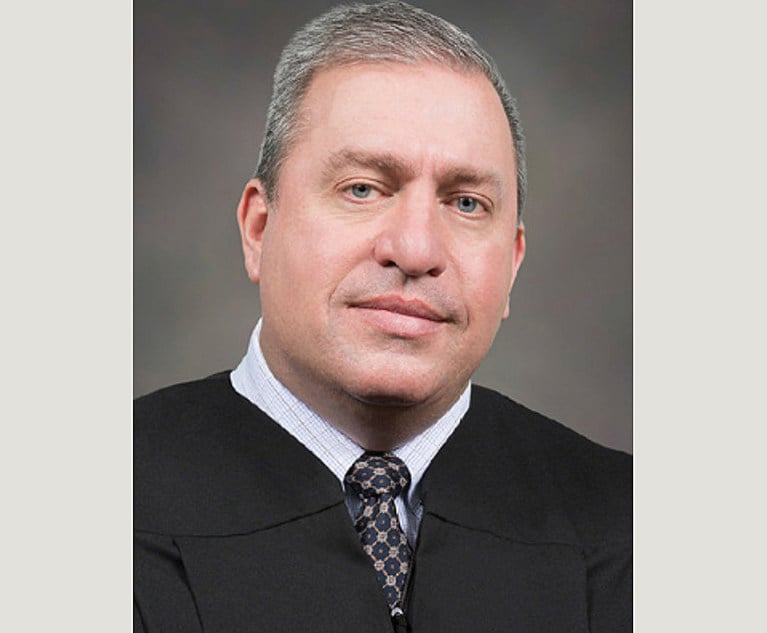 Credit: JaysonPhotography/Shutterstock.com
Credit: JaysonPhotography/Shutterstock.comWoman Denied Unemployment After Facebook Post About Slitting Co-Worker's Throat
A woman who claimed on Facebook that she would have slit a co-worker's throat during an alleged altercation had they not been on the job is ineligible for unemployment benefits, the Commonwealth Court has ruled.
April 18, 2019 at 10:45 AM
3 minute read
A woman who claimed on Facebook that she would have slit a co-worker's throat during an alleged altercation had they not been on the job is ineligible for unemployment benefits, the Commonwealth Court has ruled.
A three-judge panel consisting of President Judge Mary Hannah Leavitt and Judges Anne Covey and Michael Wojcik denied Shannon Cummins' appeal of an Unemployment Compensation Board of Review's determination that she committed misconduct disqualifying her from receiving benefits.
According to Leavitt's opinion, Cummins claimed a supervisor at Force Industries Inc. placed his hands on her during a discussion about her not wearing safety goggles. The supervisor, Kenny McBrearty, testified that he did touch her arm to move her into his office to talk about her refusal to wear safety goggles.
Afterward, according to the opinion, Cummins took to Facebook, writing: “'Today, a man put his hands on me. It's then when [you] realize how weak they are that they can't pick on someone of their own kind. I learned willpower, self[-]restraint and gained dignity. I wonder how he feels now.'”
In the comment section of the post, according to the opinion, she then wrote, “'I would [have] sliced his throat open if it didn't happen at work. And had no remorse.'”
According to Leavitt, three witnesses told police who were called in response to the threat that McBrearty did not shove Cummins, as she had claimed, but escorted her from the shop floor.
After seeing the post, the company president fired Cummins. The plaintiff then sought unemployment benefits, but was denied by an unemployment board referee, who found the Facebook post constituted “willful misconduct.”
“The referee rejected claimant's argument that her statement was not a threat, finding that it was 'specific and overtly menacing,'” Leavitt said. “He concluded that because claimant's statement 'would be disruptive and cause discord amongst knowing individuals at the workplace,' it constituted willful misconduct.”
Cummins argued on appeal that the board erred in finding her Facebook post was a direct threat. She further maintained that the board erred in holding that she committed willful misconduct because she did not post the comment while at work.
However, Cummins failed to convince the court.
“We reject claimant's argument that she did not make a threat because her statement was conditioned on the incident hypothetically happening outside of work and outside the presence of coworkers,” Leavitt said. “Likewise, claimant's use of the subjunctive 'would have' does not reduce the severity of her words. Further, although claimant was expressing her present feelings about a past incident, her words expressed an intent to cause physical harm.”
Leavitt also said the fact that the threat was not made at work makes no difference.
“Cummins,” Leavitt said, “made her threatening statement on Facebook as a result of her confrontation with McBrearty at work. At the hearing, claimant testified that she wrote the post later that evening because '[she] was mad that [McBrearty] still had a job and [she's] sitting at home and nothing was being done.' Claimant's conduct was sufficiently connected to her work to constitute willful misconduct.”
Cummins represented herself in the case. The board was represented by Janet Tarczy. Cummins did not return a call seeking comment. The unemployment board spokesperson declined to comment.
This content has been archived. It is available through our partners, LexisNexis® and Bloomberg Law.
To view this content, please continue to their sites.
Not a Lexis Subscriber?
Subscribe Now
Not a Bloomberg Law Subscriber?
Subscribe Now
NOT FOR REPRINT
© 2024 ALM Global, LLC, All Rights Reserved. Request academic re-use from www.copyright.com. All other uses, submit a request to [email protected]. For more information visit Asset & Logo Licensing.
You Might Like
View All
Pa. High Court to Weigh Parent Company's Liability for Dissolved Subsidiary's Conduct
3 minute read
Pa. Supreme Court Taps New Philadelphia Family Division Administrative Judge
3 minute read
People in the News—Nov. 27, 2024—Flaster Greenberg, Tucker Arensberg
3 minute read
Trending Stories
Who Got The Work
Michael G. Bongiorno, Andrew Scott Dulberg and Elizabeth E. Driscoll from Wilmer Cutler Pickering Hale and Dorr have stepped in to represent Symbotic Inc., an A.I.-enabled technology platform that focuses on increasing supply chain efficiency, and other defendants in a pending shareholder derivative lawsuit. The case, filed Oct. 2 in Massachusetts District Court by the Brown Law Firm on behalf of Stephen Austen, accuses certain officers and directors of misleading investors in regard to Symbotic's potential for margin growth by failing to disclose that the company was not equipped to timely deploy its systems or manage expenses through project delays. The case, assigned to U.S. District Judge Nathaniel M. Gorton, is 1:24-cv-12522, Austen v. Cohen et al.
Who Got The Work
Edmund Polubinski and Marie Killmond of Davis Polk & Wardwell have entered appearances for data platform software development company MongoDB and other defendants in a pending shareholder derivative lawsuit. The action, filed Oct. 7 in New York Southern District Court by the Brown Law Firm, accuses the company's directors and/or officers of falsely expressing confidence in the company’s restructuring of its sales incentive plan and downplaying the severity of decreases in its upfront commitments. The case is 1:24-cv-07594, Roy v. Ittycheria et al.
Who Got The Work
Amy O. Bruchs and Kurt F. Ellison of Michael Best & Friedrich have entered appearances for Epic Systems Corp. in a pending employment discrimination lawsuit. The suit was filed Sept. 7 in Wisconsin Western District Court by Levine Eisberner LLC and Siri & Glimstad on behalf of a project manager who claims that he was wrongfully terminated after applying for a religious exemption to the defendant's COVID-19 vaccine mandate. The case, assigned to U.S. Magistrate Judge Anita Marie Boor, is 3:24-cv-00630, Secker, Nathan v. Epic Systems Corporation.
Who Got The Work
David X. Sullivan, Thomas J. Finn and Gregory A. Hall from McCarter & English have entered appearances for Sunrun Installation Services in a pending civil rights lawsuit. The complaint was filed Sept. 4 in Connecticut District Court by attorney Robert M. Berke on behalf of former employee George Edward Steins, who was arrested and charged with employing an unregistered home improvement salesperson. The complaint alleges that had Sunrun informed the Connecticut Department of Consumer Protection that the plaintiff's employment had ended in 2017 and that he no longer held Sunrun's home improvement contractor license, he would not have been hit with charges, which were dismissed in May 2024. The case, assigned to U.S. District Judge Jeffrey A. Meyer, is 3:24-cv-01423, Steins v. Sunrun, Inc. et al.
Who Got The Work
Greenberg Traurig shareholder Joshua L. Raskin has entered an appearance for boohoo.com UK Ltd. in a pending patent infringement lawsuit. The suit, filed Sept. 3 in Texas Eastern District Court by Rozier Hardt McDonough on behalf of Alto Dynamics, asserts five patents related to an online shopping platform. The case, assigned to U.S. District Judge Rodney Gilstrap, is 2:24-cv-00719, Alto Dynamics, LLC v. boohoo.com UK Limited.
Featured Firms
Law Offices of Gary Martin Hays & Associates, P.C.
(470) 294-1674
Law Offices of Mark E. Salomone
(857) 444-6468
Smith & Hassler
(713) 739-1250





